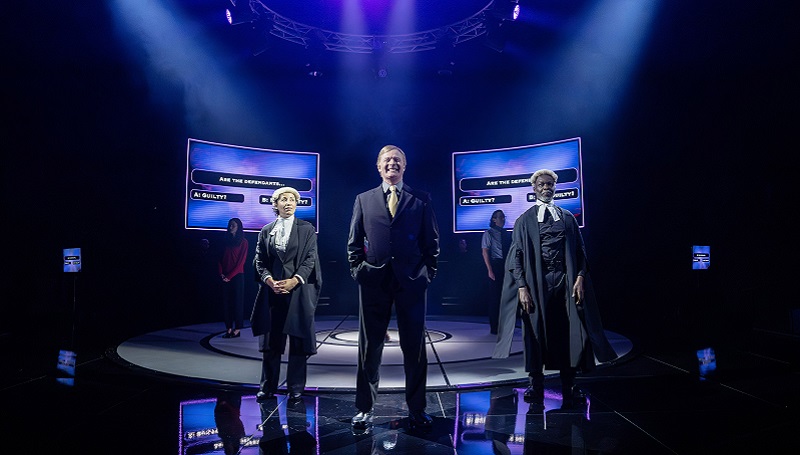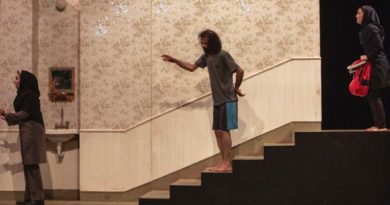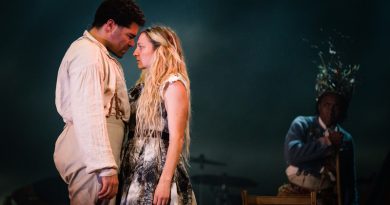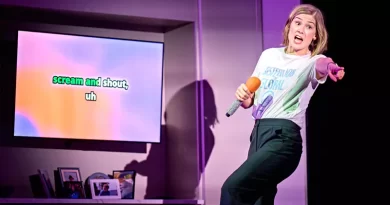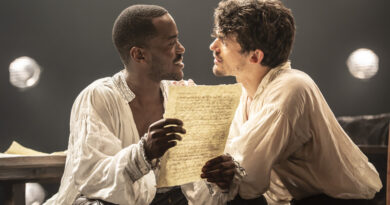“Quiz” at the Chichester Festival Theatre
Simon Jenner in West Sussex
October 1 2023
“In the world of quizzing, the man who has the questions is king,” conspirator Paddy Spooner boasts when he comes forward. “But the man who has all the answers is God.” There’s a knot of questions in James Graham’s 2017 play Quiz, now thoroughly revised and returning to Chichester (the Festival Theatre, not the Minerva) directed by Daniel Evans and Seán Linnen.

Lewis Reeves and Rory Bremner.
Photo credit: Johan Persson.
It runs till September 30th 2023 then tours. The Coughing Major Millionaire Scandal with question master Chris Tarrant (Rory Bremner) as draw, comes home briefly.
Though taking place in 2001, the day before 9/11, the story resonated enough to interest Graham a decade and a half later. And cheating at game shows to enrich yourself touches (as Graham shows ) a phenomenon: Britons hate cheats and will tear them down.
At its core Quiz asks us the final answers. More, it asks us to judge – beyond the guilty/not guilty buzzer we’re twice enjoined to press – what’s right or wrong. A victimless crime? Are real victims the dog kicked to death and cat fatally injured, both belonging to couple Charles Ingram (Lewis Reeves) and Diana Ingram (Charley Webb) at the heart of the scandal?
Perhaps it’s the public, twitched out of their sense – and any chance – of fair play by a syndicate whose actions flicker across the stage. These figures are like a dense fog early in the first act. Mocking attempts at fairness, their entrances and exits flash like one of their own dodgy hand signals.
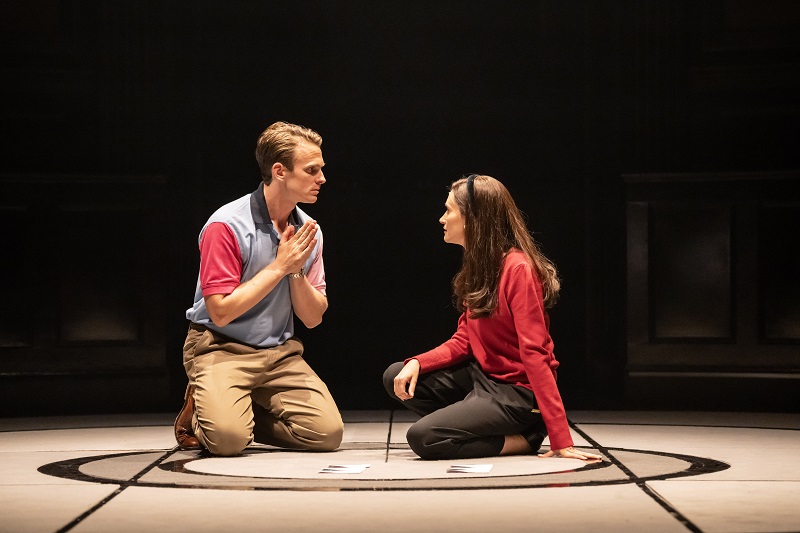
Lewis Reeves and Charley Webb.
Photo credit: Johan Persson.
Graham uses evidence amassed since the original play and his 2020 TV mini-series. Possibly – we’re invited to consider – the victims are the Ingrams themselves: netted in a wider game between conspirators and a greedy TV industry intent on proving guilt before the major neared a million. Coughs were amplified in evidence, it’s alleged later, from original volume levels such that the major could never have heard them.
The first act exquisitely dovetails trial with quiz, with the TV producers troubleshooting ideas and scrutinising early contestants. They’re dismayed that the show conveys privilege on the white middle-classes. It’s ITV. Something must be done. They too load the dice.
The structure here is so good that you wonder how Graham can top that in the second act, which sprawls in a set of affecting variations and devilish re-runs
One quiz of our own perhaps: the scarcity of Bremner’s unnervingly accurate Tarrant. He’s in key places in the thrilling first act but only briefly comments (on trial records) in the second. Unlike others, he’s not involved in speculative scenes.
Neverthless one actor – Mark Benton – shines in an assortment of roles: Judge Rivlin in the trial first act (and subsequently, when the legals proclaim they’re actors); tyro bully ITV producer David Liddiment pacing round and round dismissively until he’s hooked by wily, witty TV deviser David Briggs (Jay Taylor). He’s also mocking syndicate-master Paddy Spooner who almost steals the show and confirms everything but names and details. Benton’s also another exasperated producer Adrian Woolfe. Benton lifts the second act with his appearances.
That’s not to dismiss the sterling twitchiness of Reeves’s Major Charles, a superb hunch of a nerdy Mensa-scoring patrician; nor his wife, Webb’s anxious, warm but obsessively “curious” Diana. One expects a touch more patrician hauteur. Webb warms Diana to a more sympathetic, loyal wife who has breaking points.
It’s Diana’s obsession with quizzes (she’s even writing a how-to-win book) and her luckless brother Adrian Pollock (Taylor again) that darken counsel. It’s Pollock who is approached by Welsh conspirator Tecwen Whittock (Marc Antolin, memorably oleaginous and dodgy) the only one to stand trial with the Ingrams, since Pollock flees. Pollock refuses Whittock’s 25% offer; but invites him to reach out to the couple.
The first half is riveting, with its twin narrative and excellent prosecutor/defence match in Nicholas Hilliard QC (Leo Wringer) and Sonia Woodley QC (Danielle Henry). There are also strong appearances from Sukh Ojla as shaking contestant Rachel Da Costa, quick thinking producer Claudia and a TV production manager whose actions might hold the final clue.
Even in a second half broken up to little purpose by boppy cameos it’s calm voices that tell. At one point the excellent puppets, wigs, hair and makeup of Campbell Young Associates makes a scene look as if it’s on amphetamines. But rent-a-quotes from a multi-roling cast as celebs can yank things out of focus and despite their own energy, begin to sap ours.
So Paul Smith (Stefan Adegbola) is eloquent, standing for what he deems fair play: “We were naïve. We believed people would play the game in the spirit it was intended, but serious quizzers began to realize the massive potential.” Adegbola invests him (and more briefly Alyn Morris and Police Officer) with genuine outrage; perhaps he deserves sympathy.
Naomi Said and Jonnie Riordan’s movement swirls innocent, guilty and not-proven people on and off Robert Jones’s sparkling horseshoe-shaped set. In particular there are disturbing scenes as mobs cough around the couple when they travel by tube. It’s chilling.
Above all this Tim Reid’s video diptych beams magnifications of actors or other data. It includes the all-important voting, a feature of the evening. As it was for several interactive shows, including Graham’s Privacy at the Donmar in 2014, the start of a four-year vogue that seems to have receded. Ryan Day’s lighting dazzles, though it can hit you between the eyes. This can be true of sound by Ben and Max Ringham too though their contribution is happily modulated.
One of Graham’s fiendishly multi-layered, moral plays, this sustains interest if not impetus to the end where again you’ll find yourself asked to confirm or revise your opinion. The recent Wagatha Christie might at least be partially inspired by Quiz but with a more clearly enjoyable narrative. Graham is more curious about that marginal point where we question ourselves.
The pathos in the second act has palpable designs on us. Judge Rivlin sprang a surprise. Some information out there isn’t mentioned. But one can suggest that the Ingrams were by no means ruined. Charles went on to appear in several TV shows over the next decade and a half. The major might have been playing us, but then Graham might wryly smile, so has he. And so has Quiz.

